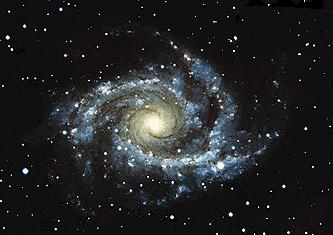 For virtually all of human history, the study of cosmology
has been an exercise in either mythology or guesswork.
Remarkably, in large part due to advances in observing
capability provided by the space program, we are on the
verge of obtaining quantitative answers to some of the most
basic questions about the nature of the Universe: How old is
it now? Will it live forever? How did its basic structures
form? Recent work combining observations from the Hubble
Space Telescope and a number of ground-based telescopes
has substantially reduced the uncertainty in our measurement
of the rate of cosmic expansion, and hence in our estimate of
the Universe's age. These efforts also have placed looser
constraints on the two cosmological parameters governing whether the Universe will expand
forever, or will ultimately turn around and collapse. Now there is evidence that the rate of
the universe's expansion is actually growing. The cosmos is accelerating. Future observations
to pin down the acceleration of the universe along with figuring out what the cosmological
constant is, will help determine the ultimate fate of the universe.
For virtually all of human history, the study of cosmology
has been an exercise in either mythology or guesswork.
Remarkably, in large part due to advances in observing
capability provided by the space program, we are on the
verge of obtaining quantitative answers to some of the most
basic questions about the nature of the Universe: How old is
it now? Will it live forever? How did its basic structures
form? Recent work combining observations from the Hubble
Space Telescope and a number of ground-based telescopes
has substantially reduced the uncertainty in our measurement
of the rate of cosmic expansion, and hence in our estimate of
the Universe's age. These efforts also have placed looser
constraints on the two cosmological parameters governing whether the Universe will expand
forever, or will ultimately turn around and collapse. Now there is evidence that the rate of
the universe's expansion is actually growing. The cosmos is accelerating. Future observations
to pin down the acceleration of the universe along with figuring out what the cosmological
constant is, will help determine the ultimate fate of the universe.
Links:
NASA's Earth Observatory
Explore with scientists the causes and effects of climatic and environmental change through the use of real satellite data.
The Nine Planets
Take a multimedia tour of the solar system, while learning about the history, mythology, and current scientific knowledge of each of the planets and moons.
Structure and Evolution of the Universe
NASA's quest to understand the Universe:
its evolution, structure and ultimate fate.
Science@NASA
Read articles about space science, earth science and astrology.
Space Telescope Science Institute
Official HST site from the astronomical research
center responsible for operating the Hubble Space Telescope as an international
observatory.
Frequently Asked Questions in Cosmology
CNN - Scientists stunned to learn universe may be accelerating
NASA (National Aeronautics and Space Administration)homepage
Books:
 Einstein's Dream: The Search for a Unified Theory of the Universe Einstein's Dream: The Search for a Unified Theory of the Universe
by: Barry R. Parker 2000
Physicist and popular science writer Barry Parker speaks to the broadest possible audience in bringing Einstein's theories to life.
 Beyond Einstein: The Cosmic Quest for the Theory of the Universe Beyond Einstein: The Cosmic Quest for the Theory of the Universe
by: Michio Kaku 2004
A "physicists' biography of a physicist."
 God's Equation: Einstein, Relativity, and the Expanding Universe God's Equation: Einstein, Relativity, and the Expanding Universe
by: Amir D. Aczel 2003
Amir D. Aczel looks at the mathematics behind Einstein's grand theories.
 Einstein's Greatest Blunder? Einstein's Greatest Blunder?
by: Donald Goldsmith 1997
This book, by the award-winning science writer Donald Goldsmith, takes on key questions about the origin and evolution of the cosmos. By clearly laying out what we currently know about the universe as a whole, Goldsmith lets us see firsthand whether modern cosmology is in a state of crisis
 The Awakening of Intelligence The Awakening of Intelligence
by: Jiddu Krishnamurti 1987
An introduction to the teachings of spiritual philosopher J. Krishnamurti.
|






